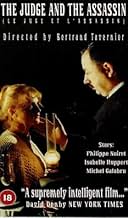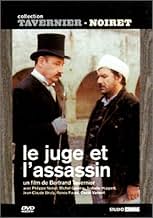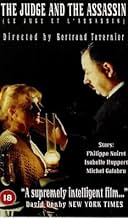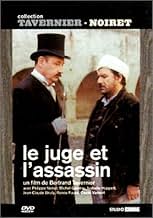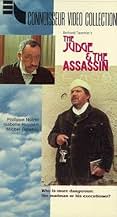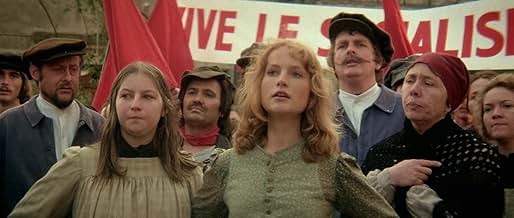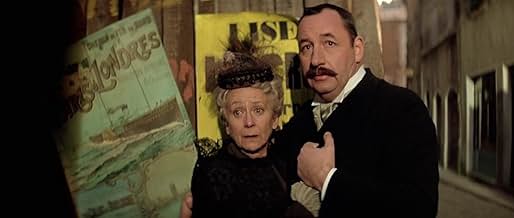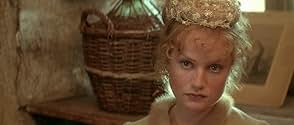AVALIAÇÃO DA IMDb
7,3/10
2,5 mil
SUA AVALIAÇÃO
Adicionar um enredo no seu idiomaAn unstable former French Sergeant commits many atrocities. A judge considers how this case could benefit or damage his career.An unstable former French Sergeant commits many atrocities. A judge considers how this case could benefit or damage his career.An unstable former French Sergeant commits many atrocities. A judge considers how this case could benefit or damage his career.
- Direção
- Roteiristas
- Artistas
- Prêmios
- 3 vitórias e 4 indicações no total
Jean-Claude de Goros
- Dr. Dutourd
- (as Jean-Claude de Gorros)
Avaliações em destaque
A very cursory appraisal of the film would term it as a tale of a true murderer and rapist who killed, raped and sodomized over a dozen shepherd women in rural France before being captured and guillotined. The film is much more than that. The film is more about the respected, educated judges of France who sit in judgement of the evils of less privileged evil-doers, while they are more evil in their actions and scoff at the writings of Emile Zola, that strikes a chord with the average French citizens. One judge is called "Judas" by prisoner who has been tricked, another commits suicide as he reflects on his own past actions that mirror the actions of another. Religion plays a major but discrete role--free lunches for the poor and illiterate are free only if petitions that serve the rich are signed. A judge helps a sibling of an Asian he has condemned to death by ensuring the sibling becomes a Christian and serves him for the rest of his life. Anti-Jewish posters are pasted on outer church walls. Social comments include unwritten restrictions of a Frenchwoman being allowed to marry an Asian. A judge's mother of higher classes, providing cherries in brandy to a lower-class worker but not readily approving her to be the daughter-in-law marked by a silent disapproval when she is brought home. A judge avoids visiting his girlfriend's daughter in hospital but brings flowers for the sick person. The film is less about the "assassin" and more about real life judges and other rich individuals who "judge" the less privileged.
The film is top-notch French cinema, with notable direction and casting, a superb screenplay, good cinematography and fine performances. Tavernier and Noiret made a great team, ever since Tavernier's debut film "The Clockworker of St Paul." It is a pity that this work of Tavernier is rarely discussed and appreciated.
The film is top-notch French cinema, with notable direction and casting, a superb screenplay, good cinematography and fine performances. Tavernier and Noiret made a great team, ever since Tavernier's debut film "The Clockworker of St Paul." It is a pity that this work of Tavernier is rarely discussed and appreciated.
And with him,the French cinema regained all that it had lost with the nouvelle vague:magnificent cinematography(I urge everybody to see this film in a movie theater),elaborate screenplays,Clouzot's Renoir's and Duvivier's bite ,all that made once the French cinema great."Le juge et l'assassin " is his sophomore effort ,after "l'horloger de Saint- Paul",but it was one which firmly and finally placed Tavernier among the greatest,most ambitious artists of the French cinema.
First of all,he did with Michel Galabru -who used to play in mediocre comedies - what Claude Chabrol did with Jean Yanne ("le boucher" "que la bete meure") :this actor is playing his lifetime part,revealing a talent which one would never expect from him.
France,end of the nineteenth century;anti-Semitism is rampant :twice ,a poster appears :"La croix (the cross): a paper against the Jews as no one can";Brialy's character:"we all need an outlet for our bad deeds:I have chosen the Jews,because it's safe";Renée Faure,the judge's good mother,serving the "mercy bouillon" to the Poor,provided that they sign a petition against captain Dreyfus .After the 1870 war,France was humiliated and the song a buck officer sings speaks volumes about the loss of Alsace and Lorraine.A world which Zola -whose books were burned- depicted ,where 2,500 children died in the coal mines... The killer killed 12 of them..
This is not a serial killer who comes out of the blue.Tavernier takes time to describe his mind :he was bitten by a rabid dog (or more like as one scene in a church tells us ,he was raped by a priest),he served in the army but was discharged,and mainly the girl he loved did not want him anymore.He tried to kill her and to take his own life but he failed twice,and in the asylum,they wrecked his brain.Although he is a killer,he is actually a political prisoner:he realized that as far his crimes were concerned ,the blame had to be put on a criminal society:in a remarkable scene ,the judge's mother reads the reports concerning the awful crimes as if she 's reading the tittle-tattle of the town.The serial killer identifies himself with Jesus and Joan of Arc ...
In direct contrast to hîm,we have the judge :admirably portrayed by Tavernier's favourite actor ,Philippe Noiret,he epitomizes the bourgeoisie,the man who wants to keep the world as it is;this is a very complex opaque character:nearing 50,he stills lives with his mother,and he's got nasty habits (see the scene when he buggers Isabelle Huppert).
There are a lot of things to say about "le juge et l'assassin":the film successfully recreates the atmosphere of the period,not only by its hints at Dreyfus,at a country which is bent on revenge ,at a Church which feels its power slip away (the priest thundering against "school without God" ,about 10 years after Jules Ferry instituted secular education,and about 10 years before the separation of the Church and the State in France).But it even recreates it with its original songs ,which is quite a feat.We really feel we are in the time machine,and that's the main reason why Tavernier's movie is so precious:no one can find echoes of the seventies in France,which would have dated and marred the film.Even if the socialists appear at the end of the movie,there's no connection with their impending coming in the eighties.
A masterpiece ,Tavernier's best film along with "la vie et rien d'autre".
First of all,he did with Michel Galabru -who used to play in mediocre comedies - what Claude Chabrol did with Jean Yanne ("le boucher" "que la bete meure") :this actor is playing his lifetime part,revealing a talent which one would never expect from him.
France,end of the nineteenth century;anti-Semitism is rampant :twice ,a poster appears :"La croix (the cross): a paper against the Jews as no one can";Brialy's character:"we all need an outlet for our bad deeds:I have chosen the Jews,because it's safe";Renée Faure,the judge's good mother,serving the "mercy bouillon" to the Poor,provided that they sign a petition against captain Dreyfus .After the 1870 war,France was humiliated and the song a buck officer sings speaks volumes about the loss of Alsace and Lorraine.A world which Zola -whose books were burned- depicted ,where 2,500 children died in the coal mines... The killer killed 12 of them..
This is not a serial killer who comes out of the blue.Tavernier takes time to describe his mind :he was bitten by a rabid dog (or more like as one scene in a church tells us ,he was raped by a priest),he served in the army but was discharged,and mainly the girl he loved did not want him anymore.He tried to kill her and to take his own life but he failed twice,and in the asylum,they wrecked his brain.Although he is a killer,he is actually a political prisoner:he realized that as far his crimes were concerned ,the blame had to be put on a criminal society:in a remarkable scene ,the judge's mother reads the reports concerning the awful crimes as if she 's reading the tittle-tattle of the town.The serial killer identifies himself with Jesus and Joan of Arc ...
In direct contrast to hîm,we have the judge :admirably portrayed by Tavernier's favourite actor ,Philippe Noiret,he epitomizes the bourgeoisie,the man who wants to keep the world as it is;this is a very complex opaque character:nearing 50,he stills lives with his mother,and he's got nasty habits (see the scene when he buggers Isabelle Huppert).
There are a lot of things to say about "le juge et l'assassin":the film successfully recreates the atmosphere of the period,not only by its hints at Dreyfus,at a country which is bent on revenge ,at a Church which feels its power slip away (the priest thundering against "school without God" ,about 10 years after Jules Ferry instituted secular education,and about 10 years before the separation of the Church and the State in France).But it even recreates it with its original songs ,which is quite a feat.We really feel we are in the time machine,and that's the main reason why Tavernier's movie is so precious:no one can find echoes of the seventies in France,which would have dated and marred the film.Even if the socialists appear at the end of the movie,there's no connection with their impending coming in the eighties.
A masterpiece ,Tavernier's best film along with "la vie et rien d'autre".
Michel Galabru got the highest french award for his role in this movie, the "Cesar du meilleur acteur". Galabru became then one of the greatest actor in France.
Either in comedy or in tragedy (see "Le gendarme" and "L'été meurtrier".
Either in comedy or in tragedy (see "Le gendarme" and "L'été meurtrier".
This stupendous film by Bertrand Tavernier is set against the background of the Dreyfus Affair and the workers' struggles which led to the formation of the Confédération Générale du Travail. Under the spotlight here is the abuse of power by institutions and the inequalities of the justice system.
The two leading protagonists are serial rapist and murderer Joseph Bouvier, based upon real life Joseph Vacher and played to the hilt by Michel Calabru whilst judge Fourquet has here become the unscrupulous Rousseau and is personified by the immaculate Philippe Noiret. His character is not, as an earlier reviewer has suggested, based upon forensic doctor Etienne Lacassagne who is here named Degueldre and is played by Yves Robert.
Bouvier and Rousseau could be said to represent both sides of the same coin. Bouvier is undeniably a monster but is clearly insane(or is he?) whilst Rousseau is in full possession of his faculties and is determined to have Bouvier guillotined in order to further his own ambition, even to the point of cleverly gaining Bouvier's trust so as to extract a full confession.
Ambiguity reigns supreme here and who better to play Rousseau than Noiret whose working relationship with Tavernier, numbering nine films, is a marriage made in heaven. Tavernier not only gifted Noiret challenging roles but wisely gave him free rein in performance. It is understandably Michel Calabru's tour de force as Bouvier that earned him a well-deserved César. His is inspired casting for he was mainly known for his appearances in the popular 'Gendarme' series and there was nothing in his cinematic CV that would suggest he was capable of a performance of this magnitude. His tenure throughout the 1950's with the Comédie Francaise undoubtedly stood him in good stead for this demanding role.
Marvellous support from Jean-Claude Brialy, veteran Renée Faure and moving up the ranks, the twenty-one year old Isabelle Huppert who would again work with Tavernier and Noiret in 'Coup de Torchon' and is here just one year away from her iconic role as 'La Dentelliere'.
We owe Tavernier a debt of thanks for having brought legendary writing duo Jean Aurenche and Pierre Bost in from the cold and as one would expect from exponents of 'cinéma de qualité', their script is beautifully crafted, intelligent and trenchant. Tavernier's unerring sense of place and period and his eye for detail are in evidence here whilst his preferred cinematographer Pierre-William Glenn ensures gorgeous rural images. Inspired score by another of Tavernier's regulars Philippe Sarde with the final song based upon revolutionary tunes from the Commune.
The final caption which points out that although Bouvier's unfortunate young victims numbered twelve, no less than twenty thousand children perished in the mines, serves as a stark reminder of how elusive was the concept of 'Liberté, Egalité, Fraternité'.
The two leading protagonists are serial rapist and murderer Joseph Bouvier, based upon real life Joseph Vacher and played to the hilt by Michel Calabru whilst judge Fourquet has here become the unscrupulous Rousseau and is personified by the immaculate Philippe Noiret. His character is not, as an earlier reviewer has suggested, based upon forensic doctor Etienne Lacassagne who is here named Degueldre and is played by Yves Robert.
Bouvier and Rousseau could be said to represent both sides of the same coin. Bouvier is undeniably a monster but is clearly insane(or is he?) whilst Rousseau is in full possession of his faculties and is determined to have Bouvier guillotined in order to further his own ambition, even to the point of cleverly gaining Bouvier's trust so as to extract a full confession.
Ambiguity reigns supreme here and who better to play Rousseau than Noiret whose working relationship with Tavernier, numbering nine films, is a marriage made in heaven. Tavernier not only gifted Noiret challenging roles but wisely gave him free rein in performance. It is understandably Michel Calabru's tour de force as Bouvier that earned him a well-deserved César. His is inspired casting for he was mainly known for his appearances in the popular 'Gendarme' series and there was nothing in his cinematic CV that would suggest he was capable of a performance of this magnitude. His tenure throughout the 1950's with the Comédie Francaise undoubtedly stood him in good stead for this demanding role.
Marvellous support from Jean-Claude Brialy, veteran Renée Faure and moving up the ranks, the twenty-one year old Isabelle Huppert who would again work with Tavernier and Noiret in 'Coup de Torchon' and is here just one year away from her iconic role as 'La Dentelliere'.
We owe Tavernier a debt of thanks for having brought legendary writing duo Jean Aurenche and Pierre Bost in from the cold and as one would expect from exponents of 'cinéma de qualité', their script is beautifully crafted, intelligent and trenchant. Tavernier's unerring sense of place and period and his eye for detail are in evidence here whilst his preferred cinematographer Pierre-William Glenn ensures gorgeous rural images. Inspired score by another of Tavernier's regulars Philippe Sarde with the final song based upon revolutionary tunes from the Commune.
The final caption which points out that although Bouvier's unfortunate young victims numbered twelve, no less than twenty thousand children perished in the mines, serves as a stark reminder of how elusive was the concept of 'Liberté, Egalité, Fraternité'.
Intriguing courtroom drama based on true events , dealing with a nasty murderer called Bouvier : Michel Galabru , based on an actual series killer , proceeding a criminal spree throughout France and a prejudiced judge : Philippe Noiret who has his values challenged when he has to decide if the supect person is insane or no . And eventually, considering if it benefits or harms his career .
A suspenseful, thrilling and surprising movie with historical background during Dreyfuss affaire , and the publication of Emilio Zola's J'accuse....!. A good as well as provoking flick, including drama , thrills , violence and competent performances .The peculiar relationship that develops between the murderer and the judge in the movie's focus . It results to be a nice movie shot in French with English subtitles . Duo of protagonists , Michel Galabru and Philippe Noiriet, are frankly magnificent. They are well accompanied by a fine support cast , such as : Isabelle Huppert as judge's sweetheart , Renee Faure as possessive mother , Yves Robert and Jean Claude Brialy as Procureur.
It displays evocative and shining cinematograhy by Perre William Glenn , showing splendidly the French outdoors . As well as sensitive and moving musical score by Philippe Sarde . The motion picture was compellingly directed by Bertrand Tavernier . Bernard is deemed to be one of the best French fimmakers , writing and directing thought-provoking and interesting pictures , outstanding the following ones : "Captain Conan", "Revenge of the Musketeers" , "L627" , "Daddy Nostalgia", "Life and nothing but" , "Beatrice" , "Round Midnight", "A Sunday in the Country" , "Coup de Torchon" , Spoiled Children", "Death Watch" , "The Clockmaker" , among others . Rating : 7/10 . Better than average.
A suspenseful, thrilling and surprising movie with historical background during Dreyfuss affaire , and the publication of Emilio Zola's J'accuse....!. A good as well as provoking flick, including drama , thrills , violence and competent performances .The peculiar relationship that develops between the murderer and the judge in the movie's focus . It results to be a nice movie shot in French with English subtitles . Duo of protagonists , Michel Galabru and Philippe Noiriet, are frankly magnificent. They are well accompanied by a fine support cast , such as : Isabelle Huppert as judge's sweetheart , Renee Faure as possessive mother , Yves Robert and Jean Claude Brialy as Procureur.
It displays evocative and shining cinematograhy by Perre William Glenn , showing splendidly the French outdoors . As well as sensitive and moving musical score by Philippe Sarde . The motion picture was compellingly directed by Bertrand Tavernier . Bernard is deemed to be one of the best French fimmakers , writing and directing thought-provoking and interesting pictures , outstanding the following ones : "Captain Conan", "Revenge of the Musketeers" , "L627" , "Daddy Nostalgia", "Life and nothing but" , "Beatrice" , "Round Midnight", "A Sunday in the Country" , "Coup de Torchon" , Spoiled Children", "Death Watch" , "The Clockmaker" , among others . Rating : 7/10 . Better than average.
Você sabia?
- CuriosidadesThis is a fairly straight-forward account of the crimes of Joseph Vacher. "Vacher" and "Bouvier" both mean "cowherd" in French. The names of many of the characters - like Lacassagne - have not been changed.
- Erros de gravaçãoYou can see the shadow of the microphone and the boom moving across the wall of the chapel where the priest is giving his sermon about five minutes after the beginning.
- ConexõesFeatured in Keskiyön auringon kuvat (1987)
- Trilhas sonorasLa Complainte de Bouvier l'Éventreur
Music by Philippe Sarde
Lyrics by Jean-Roger Caussimon
Performed by Jean-Roger Caussimon
Principais escolhas
Faça login para avaliar e ver a lista de recomendações personalizadas
- How long is The Judge and the Assassin?Fornecido pela Alexa
Detalhes
- Tempo de duração2 horas 8 minutos
- Mixagem de som
- Proporção
- 2.35 : 1
Contribua para esta página
Sugerir uma alteração ou adicionar conteúdo ausente

Principal brecha
By what name was O Juiz e o Assassino (1976) officially released in India in English?
Responda
![Assistir a Bande-annonce [OV]](https://m.media-amazon.com/images/M/MV5BMGRkZTUzMWItY2NmZi00YWFhLTllZTMtZmQzNmFjNmFkY2M5XkEyXkFqcGdeQXRyYW5zY29kZS13b3JrZmxvdw@@._V1_QL75_UX500_CR0)
